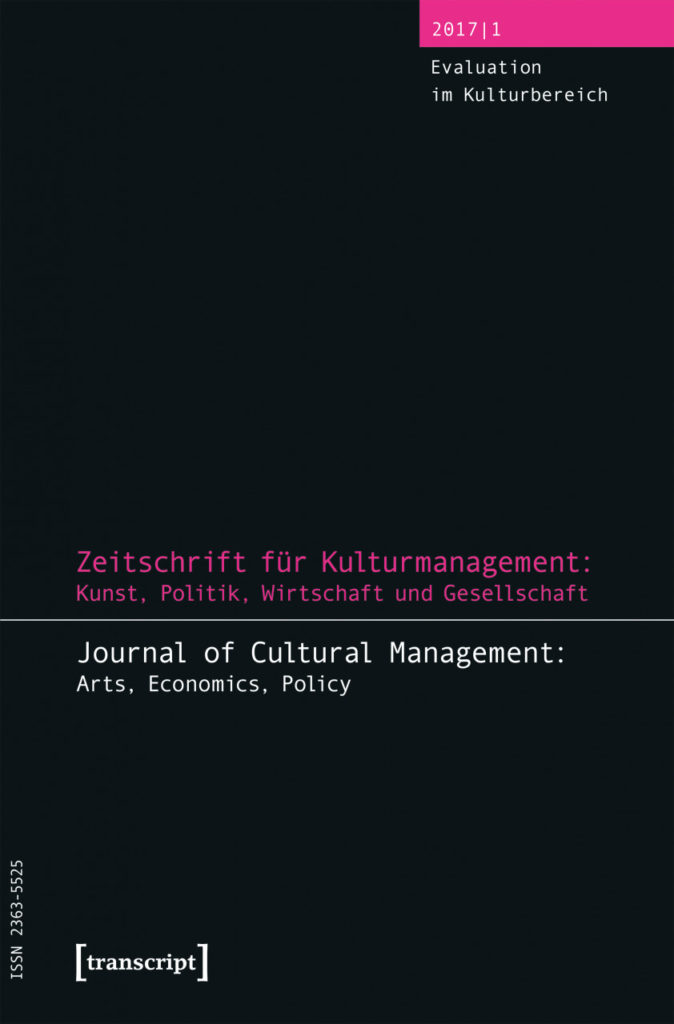Case Study
(Wie) Kultur wirkt
Wirkungsorientierte Evaluation von Kulturarbeit und kultureller Bildungsarbeit am Goethe-Institut
Abstract
In 2013, the Goethe Institut initiated a three-year project to develop an evaluation framework to measure the impact of its work on culture and cultural education. This article is divided into two parts: Part one relates to the experience of this development process and the conceptual considerations that led to a publication issued in 2016. By focusing on throughput (a value-based working approach) and analyzing the transfer of impact beyond the immediate sphere of activity, the Goethe Institut achieved added value in terms of evaluation. Part two of the article discusses the application of the evaluation concept based on a case study. Here, the authors illustrate the heuristic use of Bruno Latour’s and Michel Callon’s Actor-Network Theory in evaluations of cultural work. The article concludes with a short insight into the use of the evaluation concept for internal evaluations within the Goethe Institut as well as externally commissioned ones. The publication of the concept is also an invitation to continue a critical dialogue between cultural workers, cultural institutions, evaluators, and scholars about the opportunities and limitations of evaluating cultural work.
Keywords
2017 (1)
Evaluation im Kulturbereich

Related Articles
Evaluation im kulturpolitischen Wirkungsbereich
Grundprobleme und HerausforderungenJournal of Cultural Management 2017 (1)
Research Article
Non-visitors and museums – a practice approach
Journal of Cultural Management and Cultural Policy
Case Study
Wirkung und Qualität kombiniert
Ein Qualitätsmanagementsystem für TheaterJournal of Cultural Management 2017 (1)
Research Article
Kulturmanagementforschung
Ziele, Fragestellungen, ForschungsstrategienYearbook for Culture Management
Essay
Lernen braucht Mut
Evaluation in der kulturellen BildungJournal of Cultural Management 2017 (1)
Essay
The role of culture in development
From tangible and monetary measures towards social onesJournal of Cultural Management 2017 (2)
Research Article
© 2026, Journal of Cultural Management and Cultural Policy
Keywords
- Aesthetics
- Higher Education
- Cultural Diplomacy and Foreign Cultural Policy
- Occupation
- Career and Professional Role
- Audience Development
- Audience Studies and Visitor Studies
- Visitor Motivations
- Business
- Covid Pandemic
- Democracy
- Digitalization
- Diversity
- Third Sector
- Empirical Aesthetics
- Development
- Ethics
- Evaluation
- Field Theory
- Festival
- Film
- Federalism
- Community Arts
- Societal Change
- Ideology
- Staging
- Career
- Communication
- Concert
- Creative Industries
- Creativity
- Crisis
- Culture
- arts organizations, cultural organizations
- Cultural Participation
- Cultural Change
- Fincancing The Arts
- Cultural Promotion Law
- Cultural History
- Cultural Management
- Cultural Economy
- Cultural Organizations
- Art Education
- Cultural Policy
- Cultural Production
- Cultural Sociology
- Art Education
- Cultural Understanding
- Arts Administration
- Cultural Industry
- Cultural Sciences
- Art
- Art Field
- Arts Research
- Artists
- Artistic Research
- Artistic Reputation
- Arts Management
- Arts Organizations
- Art education
- Arts Marketing
- Arts Administration
- Curating
- Leadership
- Literature
- Advocacy
- Management
- Marketing
- Market
- Media
- Methods Development
- Mexico
- Monumentalizing
- Museum
- Music
- Non-Visitor Studies
- Opera
- Orchestra
- Organization
- Political Expression
- Post-truth Politics
- Professional Role
- Audience
- Audience Development
- Law
- Government
- Role
- Socially Engaged Art
- Social Cohesion
- Social Change
- Social Cohesion
- Non-visitor Socio-demographics
- Socioculture
- State
- Symbolic capital
- Dance
- Participatory Justice
- Theatre
- Theatre Governance
- Theory Development
- Tourism
- Transformation
- Survey
- Entrepreneurship
- Urbanism
- Civil Society


